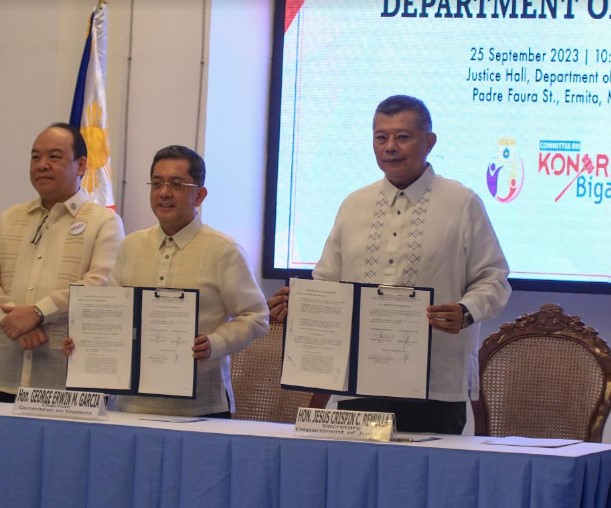Image Courtesy of Benjie Cuaresma
By Benjie Cuaresma
THE Commission on Elections (Comelec) and the Department of Justice (DOJ) have forged an agreement to vigorously pursue and prosecute individuals involved in vote-buying during the upcoming barangay and Sangguniang Kabataan Elections (BSKE).

JOINT FORCE. Commission on Elections Chairperson George Erwin Garcia (left) and Department of Justice Secretary Jesus Crispin Remulla show to the media the copy of their offices entered into, an agreement to go after vote-buyers in the Barangay and Sangguniang Kabataan Elections at the DOJ office in Manila on Monday (Sept. 25, 2023). Remulla said prosecutors nationwide will be on duty to accept complaints on Oct. 30, election day. (Photo by Benjie Cuaresma)
Justice Secretary Jesus Crispin Remulla announced that prosecutors nationwide will be on standby to receive complaints on election day, October 30.
“The fiscals will be readily available to handle potential cases,” he informed the media during the signing of the “Kontra Bigay” memorandum of agreement at the DOJ office in Manila. He emphasized the importance of having witnesses since many instances of vote-buying involve electronic wallets rather than physical cash transactions.
Remulla clarified that there is no conflict between this initiative and a recent DOJ directive to thoroughly review all charge sheets submitted to prosecutors to ensure that only complaints with a reasonable chance of conviction proceed to court. Complete and substantial sworn statements from witnesses could turn many cases into “open-and-shut” scenarios.
Comelec Chairperson George Erwin Garcia expressed confidence in the effectiveness of measures such as warrantless arrests for individuals engaged in vote-buying and red-flags such as the transportation of large sums of cash and giveaways as effective deterrents.
To date, Comelec has received 23 complaints related to vote-buying. The practice of “flying voters” (voters transported to different voting areas) has diminished significantly due to the adoption of modern voter identification systems, Garcia added.
The campaign period for the BSKE is set from October 19 to 28.
Following the closure of the candidacy filing period on September 4, Comelec reported a total of 1,414,487 aspirants, comprising 96,962 candidates for punong barangay (village captain), 731,682 for members of the Sangguniang Barangay (village council), 92,774 aspirants for Sangguniang Kabataan (youth council) chair, and 493,069 for Sangguniang Kabataan council positions. (ai/mnm)
By Junex Doronio
ANTICIPATING THE LEVELLING UP of vote buying in the upcoming Barangay and Sangguniang Kabataan Elections (BSKE), the Commission on Elections (Comelec) has alerted electronic wallet operators to monitor ‘suspicious” high-volume transactions, especially in the days prior to election day.
At the same time, Comelec Chairman George Garcia sternly warned GCash, Maya and other companies involved in mobile payment services that they may face charges for conspiracy to commit vote buying.
“Doon sa mga panibagong pamamaraan ng vote buying, tulad ng by way of GCash or online banking, kasama po namin sa Committee on Kontra Bigay ay Anti-Money Laundering Council at Banko Sentral ng Pilipinas,” Comelec Commissioner Ernesto Maceda Jr. earlier said in a press briefing.
He also disclosed that the Comelec is already finalizing its rules and regulations on the penalties for vote buying for the BSKE in October, which will now cover online money transfers.
The Omnibus Election Code penalizes vote buying or selling with up to six years of imprisonment, disqualification from public office, and prohibition from exercising the right to vote.
Any political party found guilty of engaging in such acts shall pay a fine of not less than ₱10,000.
Considering that Omnibus Election Code was approved in 1985 and does not cover modern schemes of bribing during elections, the Comelec sees the need to also level up the law. (ai/mnm)
